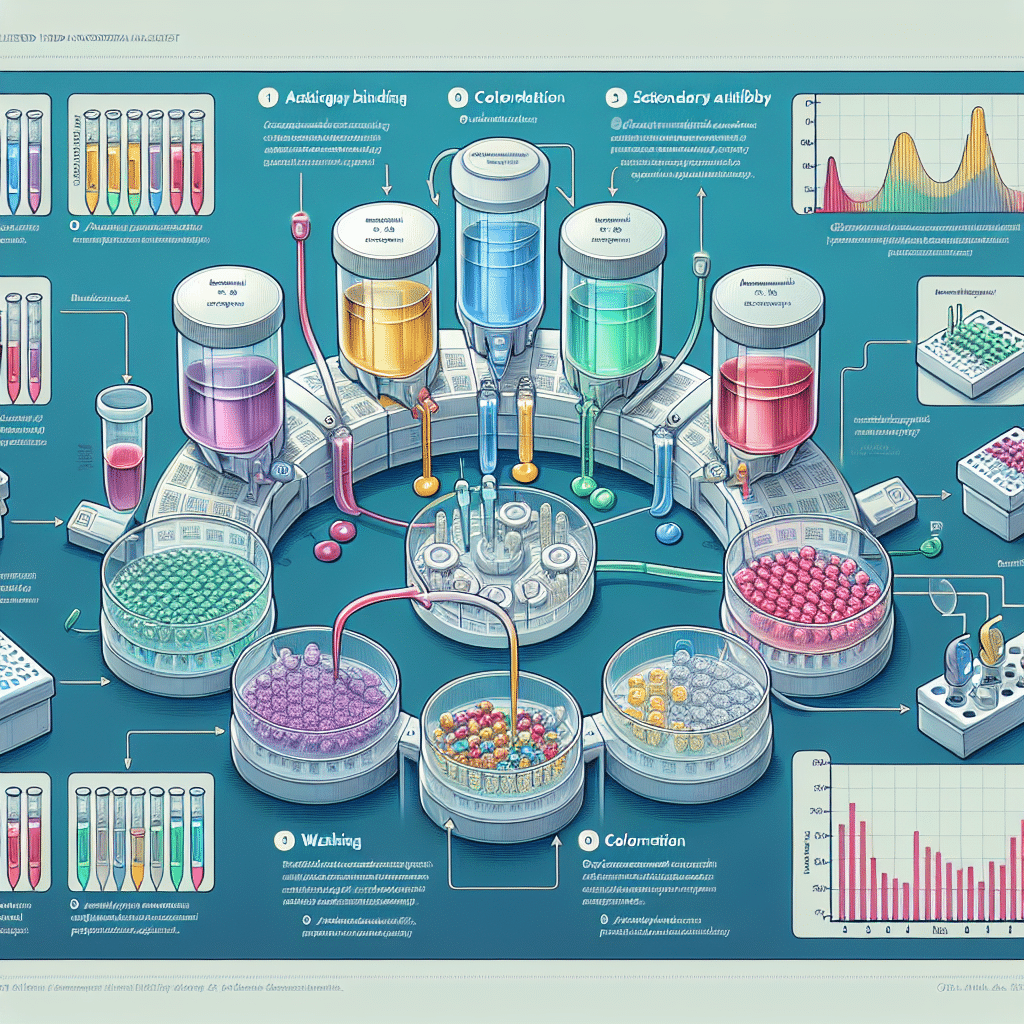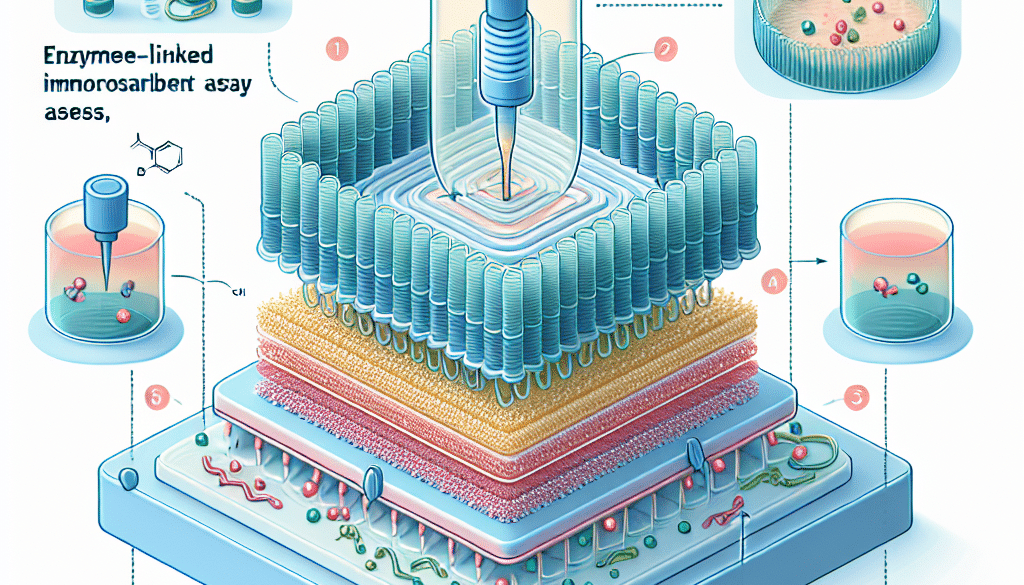ELISA (Enzyme-Linked Immunosorbent Assay): Precision in Protein Quantification
-
Table of Contents
- ELISA: Precision in Protein Quantification and Its Applications
- Understanding ELISA and Its Mechanism
- Key Components of ELISA
- Types of ELISA
- Advantages of ELISA in Protein Quantification
- Applications of ELISA
- Case Studies and Statistics
- Challenges and Considerations in ELISA
- Improving ELISA Performance
- Conclusion: The Significance of ELISA in Modern Science
- ETprotein: Your Partner for High-Quality Protein Products
ELISA: Precision in Protein Quantification and Its Applications

The Enzyme-Linked Immunosorbent Assay (ELISA) is a powerful tool used in laboratory settings to measure the concentration of antigens or antibodies in a sample with high precision. This technique has become a cornerstone in the fields of immunology, diagnostics, and quality control within the biotechnology and pharmaceutical industries. In this article, we will delve into the intricacies of ELISA, its various formats, and its significance in protein quantification.
Understanding ELISA and Its Mechanism
ELISA is a plate-based assay technique designed for detecting and quantifying soluble substances such as peptides, proteins, antibodies, and hormones. The assay involves an enzyme-conjugated antibody or antigen and a substrate that produces a measurable product upon reaction with the enzyme. The intensity of the signal produced is directly proportional to the amount of target antigen or antibody present in the sample.
Key Components of ELISA
- Coating Antigen or Antibody: The first layer attached to the well of the plate.
- Blocking Buffer: Prevents non-specific binding by saturating all unbound sites on the well surface.
- Enzyme-Linked Detection Antibodies: Bind specifically to the target antigen or antibody.
- Substrate: Reacts with the enzyme to produce a measurable signal, often a color change.
- Stop Solution: Halts the reaction to prevent overdevelopment of the signal.
Types of ELISA
- Direct ELISA: The antigen is immobilized on the plate, and a labeled antibody is used for detection.
- Indirect ELISA: Uses an unlabeled primary antibody and a labeled secondary antibody for detection.
- Sandwich ELISA: Captures the antigen between two layers of antibodies (capture and detection).
- Competitive ELISA: Antigen in the sample competes with a labeled antigen for binding to the capture antibody.
Advantages of ELISA in Protein Quantification
ELISA is favored for protein quantification due to its specificity, sensitivity, and versatility. It can measure proteins in complex samples with minimal sample preparation. The high specificity is achieved through the use of antibodies that bind uniquely to the target molecule. Sensitivity is enhanced by signal amplification through the enzymatic reaction, allowing detection of minute quantities of the analyte.
Applications of ELISA
ELISA has a wide range of applications, including:
- Disease diagnosis, such as HIV, Lyme disease, and pernicious anemia.
- Food industry applications for allergen detection and quality control.
- Pharmaceutical industry for drug level monitoring and batch testing.
- Research applications in studying protein-protein interactions and cytokine profiling.
Case Studies and Statistics
ELISA has been instrumental in various scientific breakthroughs and public health initiatives. For instance, during the early stages of the COVID-19 pandemic, ELISA-based tests were rapidly developed to detect antibodies against SARS-CoV-2, aiding in seroprevalence studies and vaccine efficacy trials. According to a study published in “The Lancet,” ELISA tests demonstrated a sensitivity of 83.3% and a specificity of 99.0% for detecting IgG antibodies against SARS-CoV-2.
In the food industry, ELISA is used to ensure compliance with labeling laws for allergens. A report by the Food Allergy Research & Education (FARE) organization highlighted that ELISA is one of the most common methods for detecting trace amounts of allergens such as peanuts, tree nuts, and gluten in food products.
Challenges and Considerations in ELISA
While ELISA is a robust technique, it is not without its challenges. Factors such as antibody quality, plate coating efficiency, and sample matrix effects can influence the accuracy and reproducibility of the assay. It is crucial to optimize assay conditions and validate the ELISA for each specific application to ensure reliable results.
Improving ELISA Performance
To enhance the performance of ELISA, researchers and technicians can:
- Use high-affinity antibodies and carefully designed buffers to minimize non-specific binding.
- Employ robust standard curves and controls within each assay to ensure accuracy.
- Implement automation to reduce human error and increase throughput.
Conclusion: The Significance of ELISA in Modern Science
ELISA remains an indispensable tool in the quantification of proteins due to its high degree of specificity, sensitivity, and adaptability to various research and diagnostic needs. Its ability to provide quantitative results makes it a valuable technique for monitoring disease progression, ensuring food safety, and facilitating drug development. As technology advances, ELISA will continue to evolve, further enhancing its precision and utility in protein quantification.
ETprotein: Your Partner for High-Quality Protein Products
If you are looking for reliable protein quantification solutions, consider ETprotein’s range of high-quality protein products. ETprotein specializes in producing and supplying a variety of organic bulk vegan proteins and plant proteins, such as:
- Organic rice protein
- Clear rice protein
- Pea protein
- Clear pea protein
- Pumpkin seed protein
- Sunflower seed protein
- Mung bean protein
- Peanut protein
With a focus on non-GMO, allergen-free products with a neutral taste, ETprotein caters to a diverse range of industries, including nutraceuticals, pharmaceuticals, cosmeceuticals, veterinary, and food and beverage sectors. Their expertise in exporting and delivering tailor-made protein powder and nutritional supplements makes them a trusted partner for your protein needs.
About ETprotein:
ETprotein, a reputable protein Chinese factory manufacturer and supplier, is renowned for producing, stocking, exporting, and delivering the highest quality organic bulk vegan protein and plant proteins. They include Organic rice protein, clear rice protein, pea protein, clear pea protein, pumpkin seed protein, sunflower seed protein, mung bean protein, peanut protein etc. Their offerings, characterized by a neutral taste, non-GMO, allergen-free attributes, cater to a diverse range of industries. They serve nutraceutical, pharmaceutical, cosmeceutical, veterinary, as well as food and beverage finished product distributors, traders, and manufacturers across Europe, USA, Canada, Australia, Thailand, Japan, Korea, Brazil, and Chile, among others.
ETprotein specialization includes exporting and delivering tailor-made protein powder and finished nutritional supplements. Their extensive product range covers sectors like Food and Beverage, Sports Nutrition, Weight Management, Dietary Supplements, Health and Wellness Products, and Infant Formula, ensuring comprehensive solutions to meet all your protein needs.
As a trusted company by leading global food and beverage brands and Fortune 500 companies, ETprotein reinforces China’s reputation in the global arena. For more information or to sample their products, please contact them and email sales(at)ETprotein.com today.












